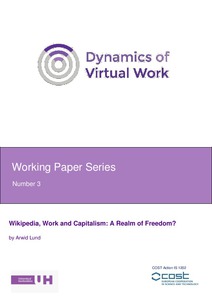Wikipedia, work and capitalism: a realm of freedom?
"The peer production of free and open software and Wikipedia has produced use value that competes with commercial exchange value and shown that people are not only motivated by economic self-interest. The peer production of Wikipedia differs from other open cooperative communities in ways that...
| Main Authors: | , |
|---|---|
| Institution: | ETUI-European Trade Union Institute |
| Format: | TEXT |
| Language: | English |
| Published: |
Hatfield
2015
University of Hertfordshire |
| Subjects: | |
| Online Access: | https://www.labourline.org/KENTIKA-19104524124919227069-Wikipedia,-work-and-capitalism.htm |
| Summary: | "The peer production of free and open software and Wikipedia has produced use value that competes with commercial exchange value and shown that people are not only motivated by economic self-interest. The peer production of Wikipedia differs from other open cooperative communities in ways that inform this study of how the Wikipedians perceive peer production’s place, influence and potential within society’s economy. Unlike free software, Wikipedia is largely based on amateurs and non-professional participants. The broad number of participants, largely comprising of amateurs, who create an encyclopaedia, has turned a number of ingrained opinions about job sharing and specialisation upside-down. Marx's idea that no one in the communist society has an exclusive occupation but instead can realise themselves in whatever sector they wish, appears to be slightly more achievable bearing Wikipedia in mind.
Peer production explores the possibility of creating a public economy based on these mechanisms and on an autonomous internet, but not necessarily antagonistic in relation to capital. According to some social scientists the idea of evolution is key for the P2P principles, which are often set against an antagonistic interpretation of social production in Marxism. Peer production has thus the potential of introducing new political thoughts in Marxism." |
|---|---|
| Physical Description: | 18 p. Digital |

